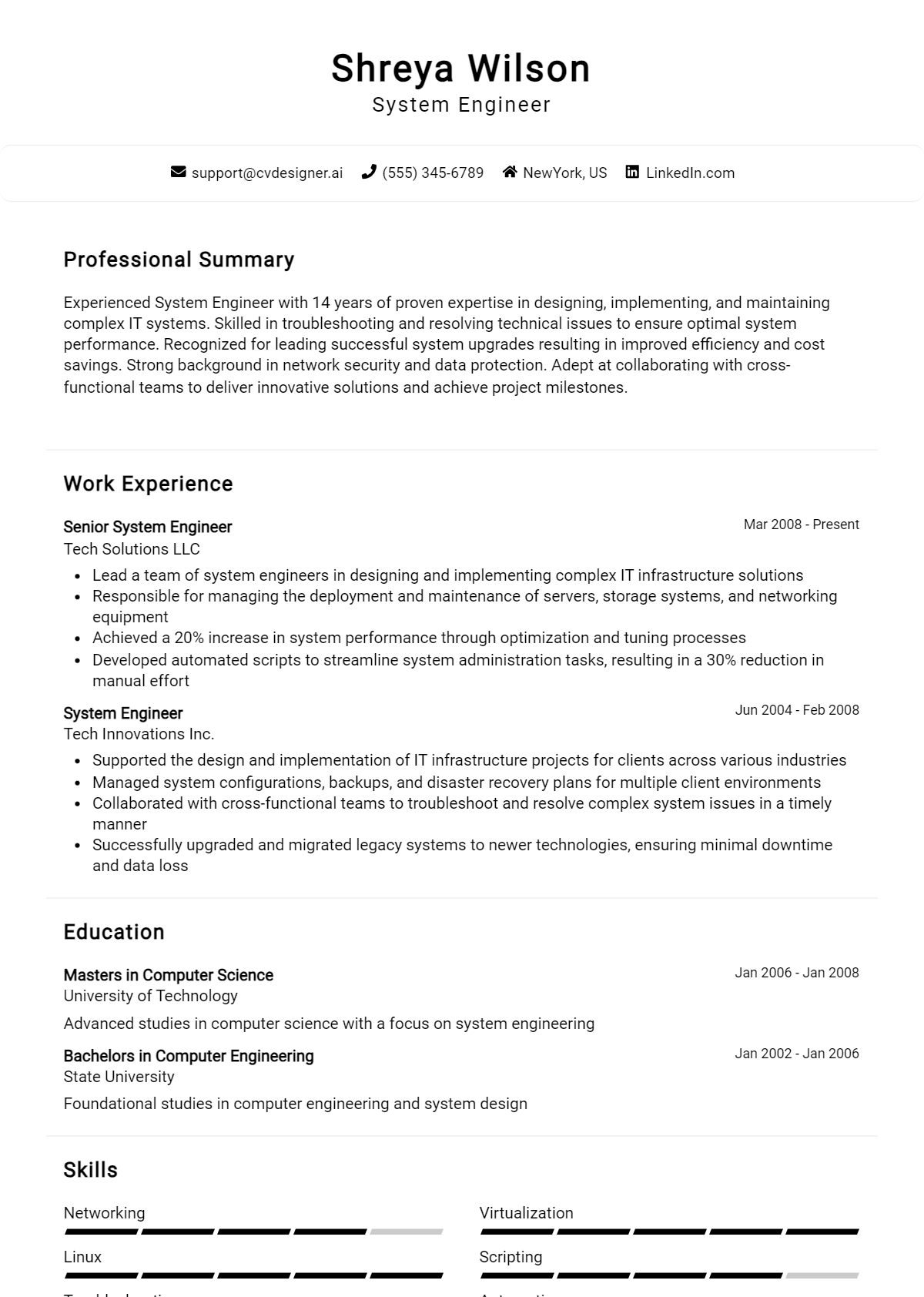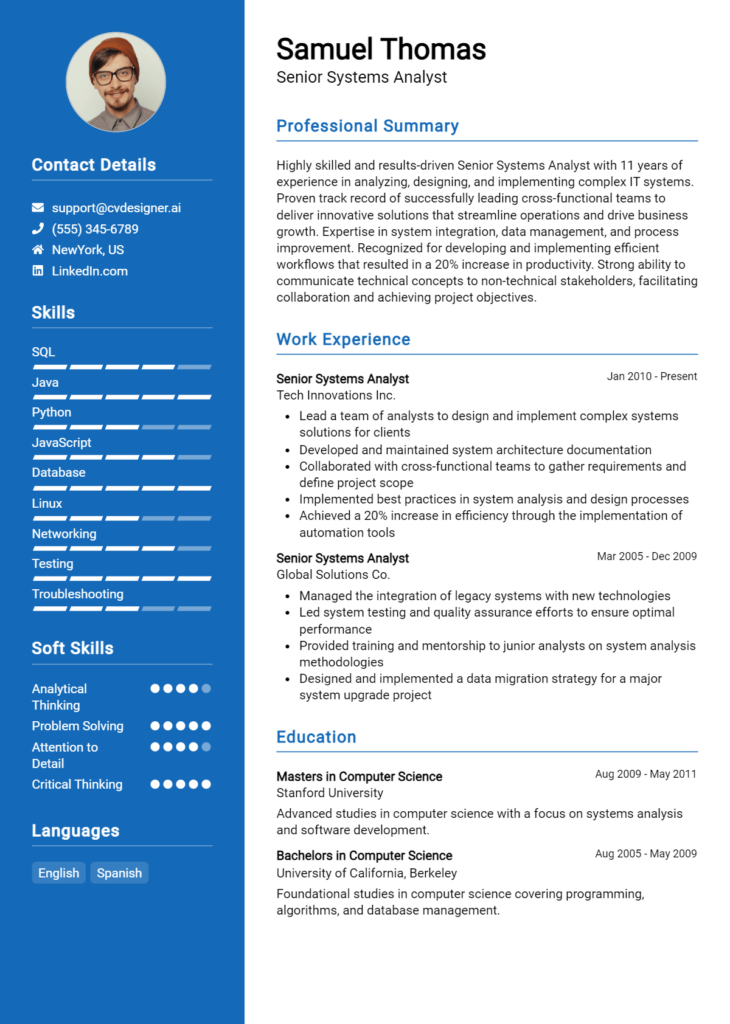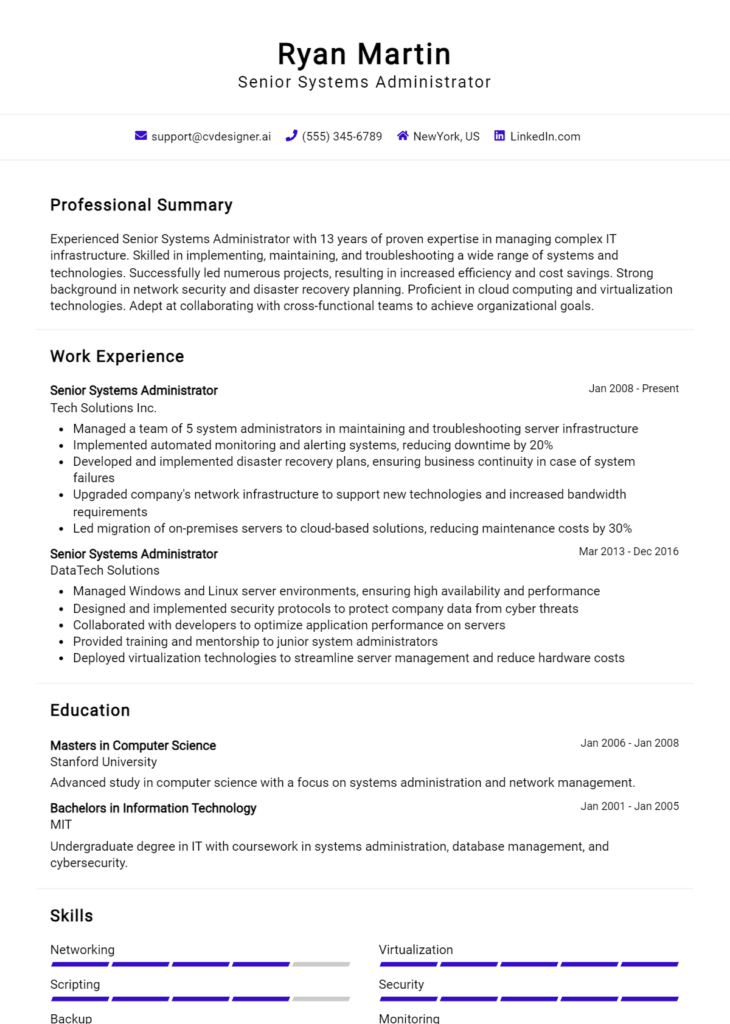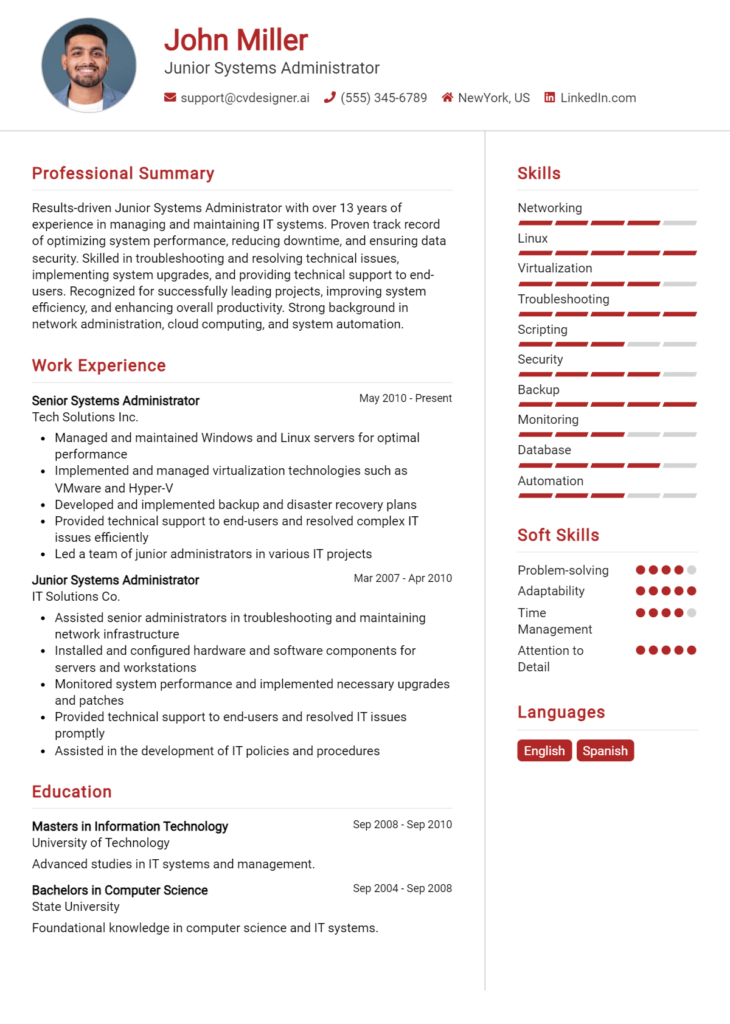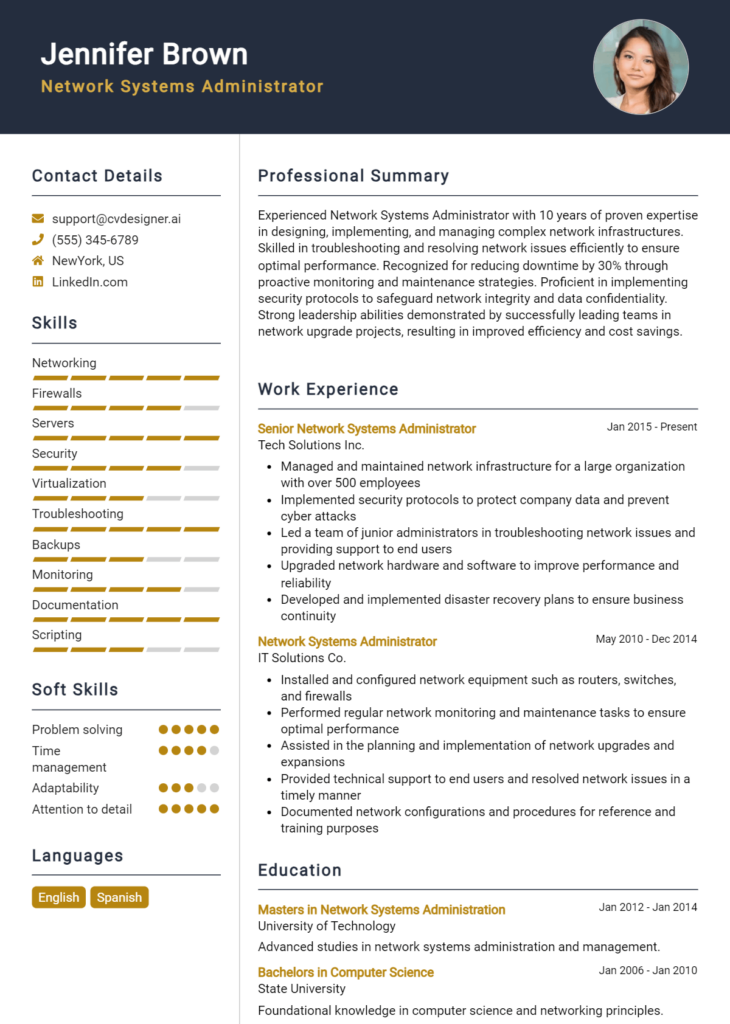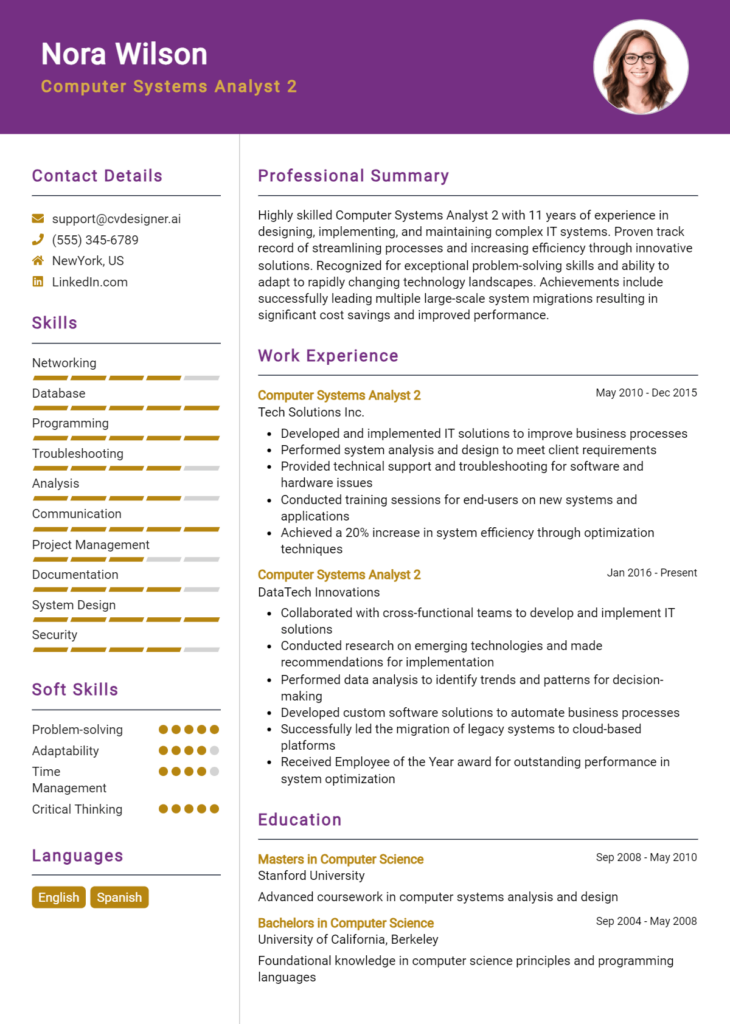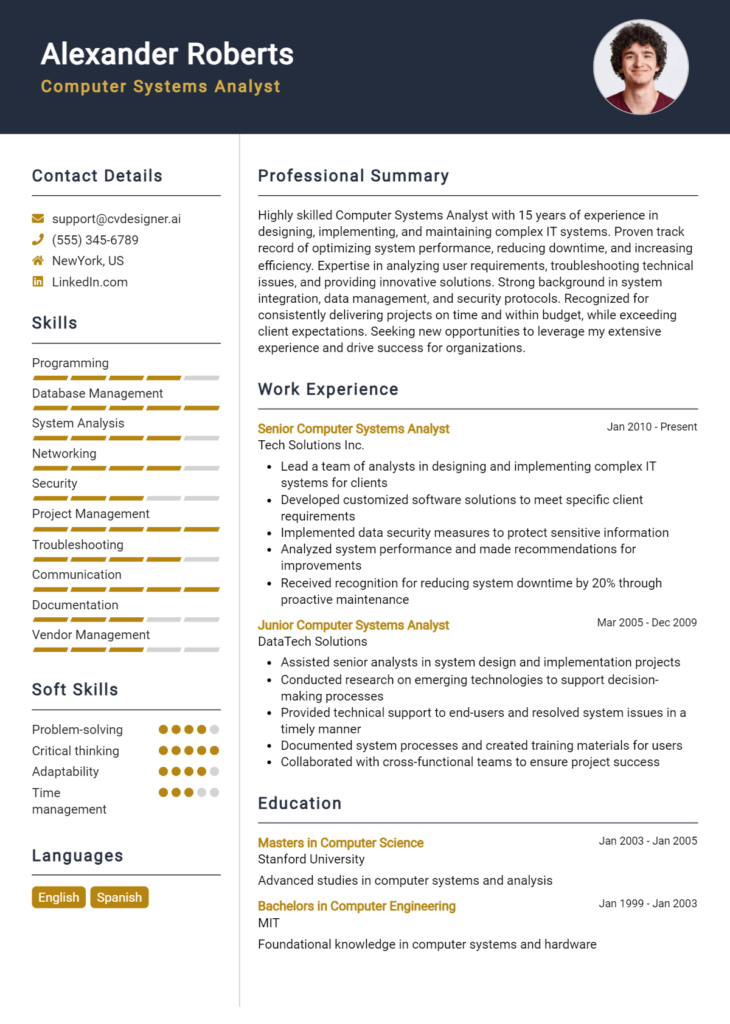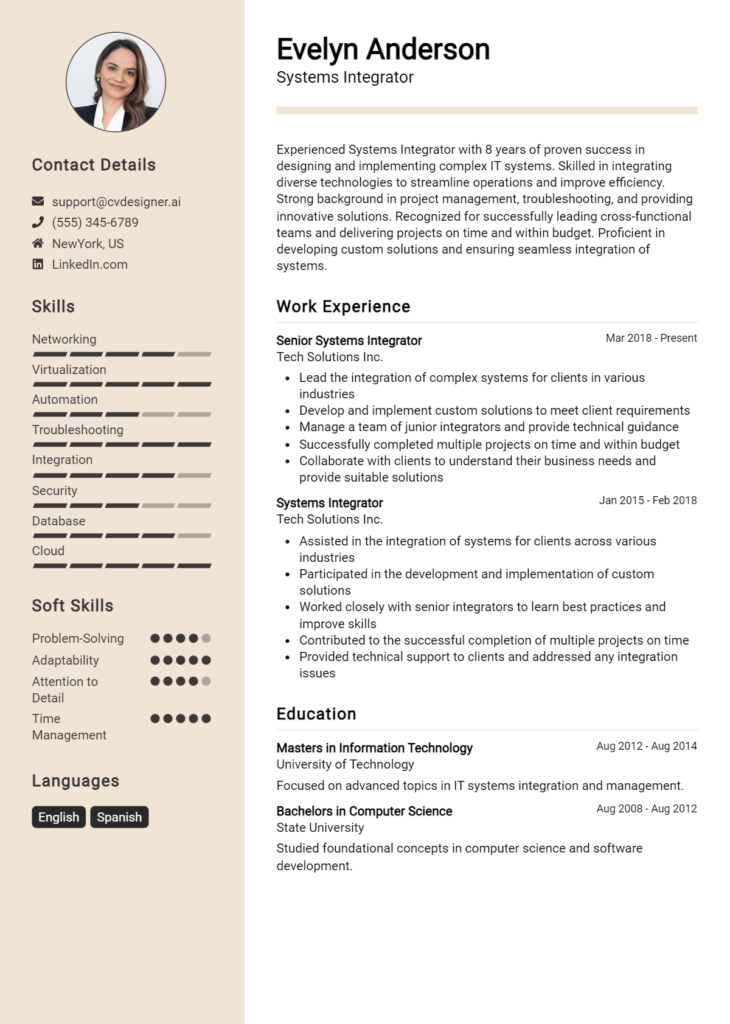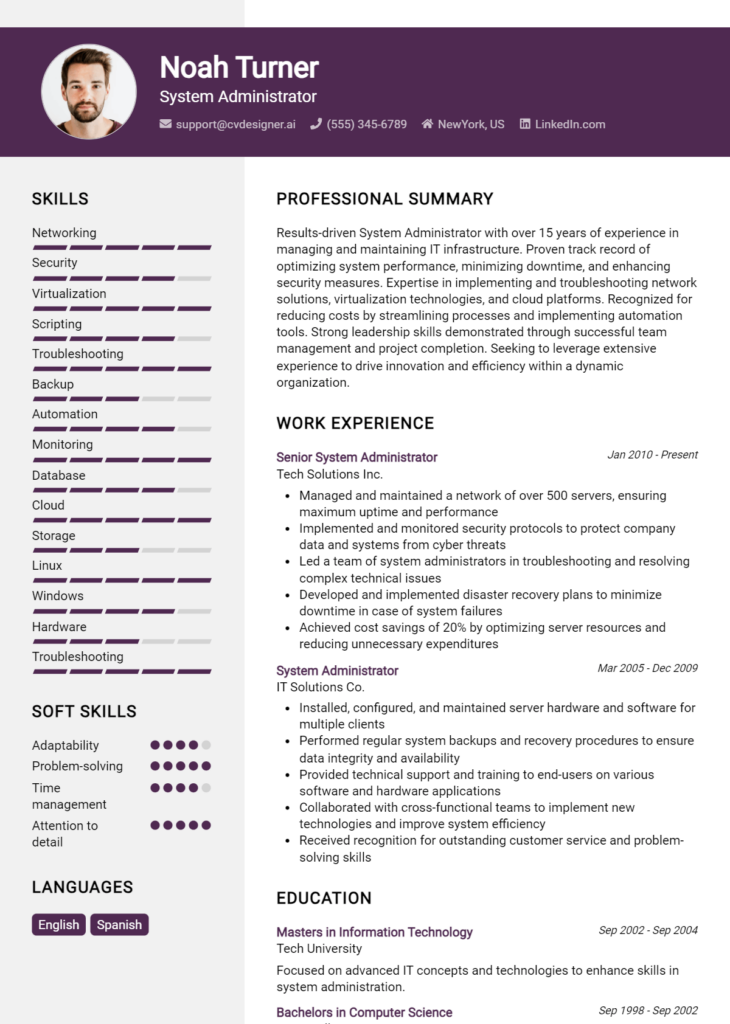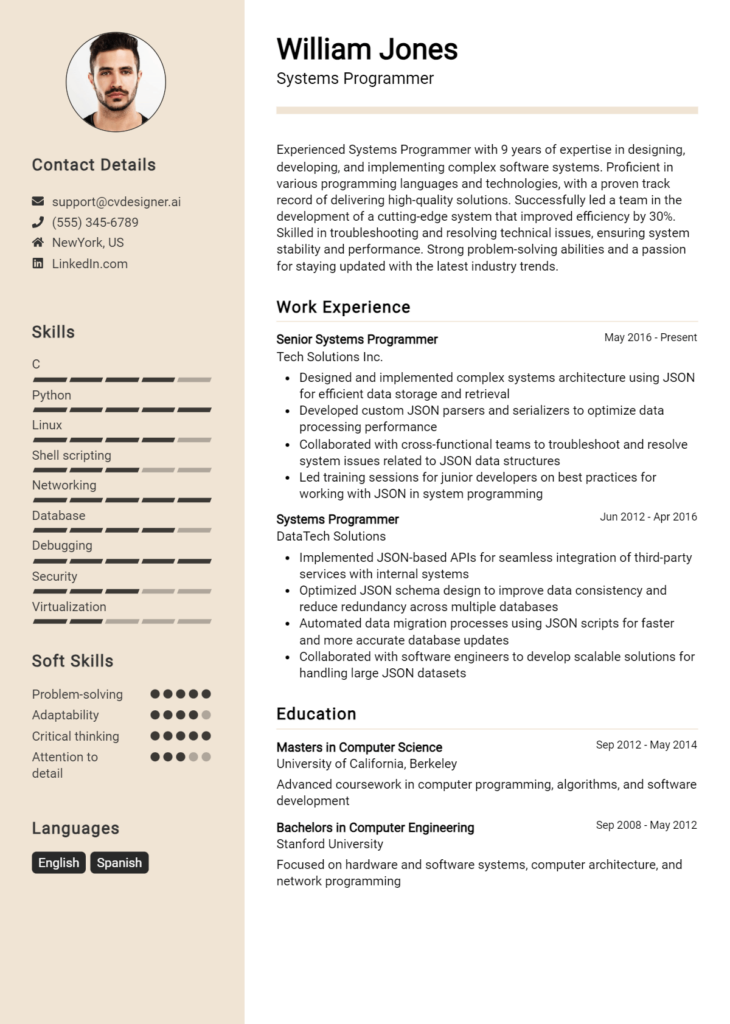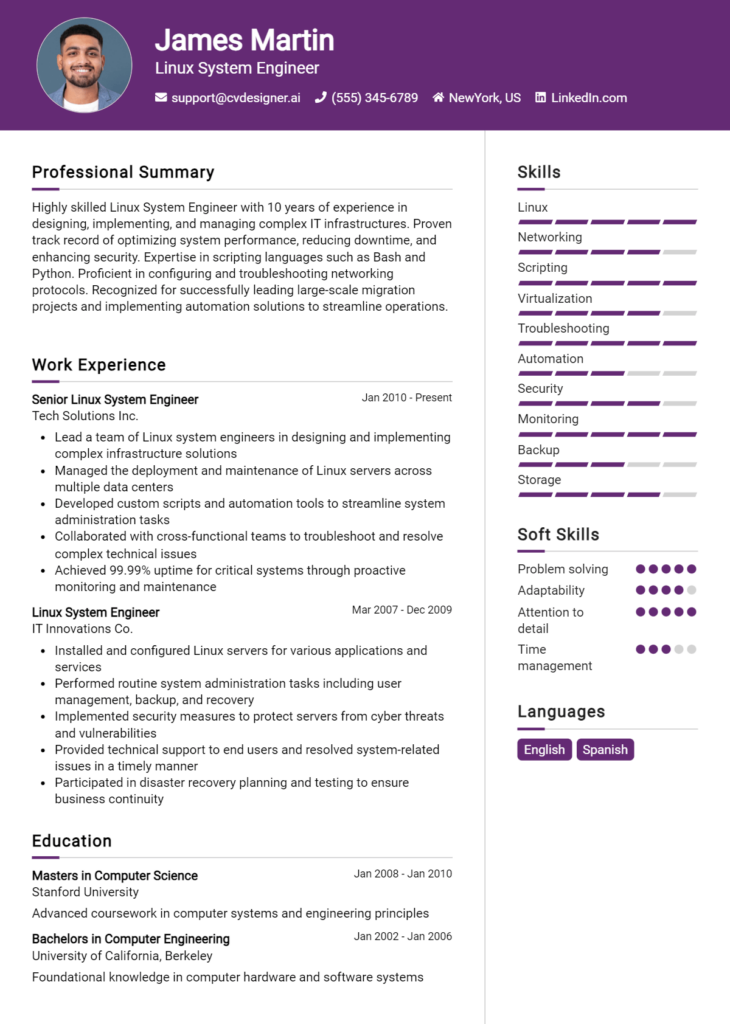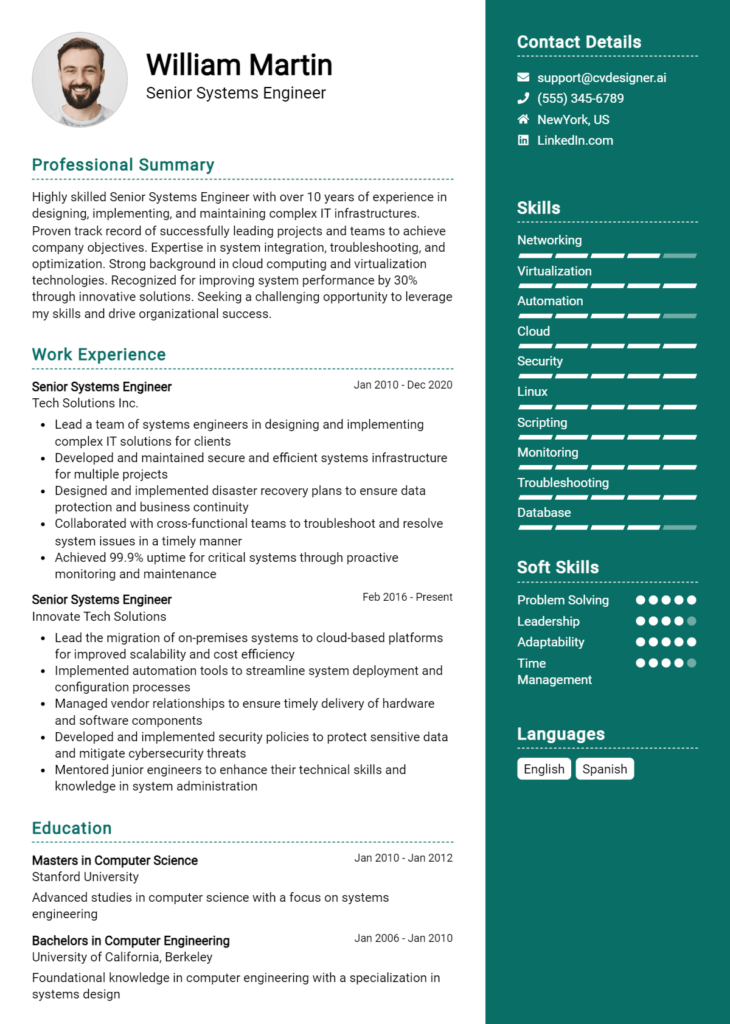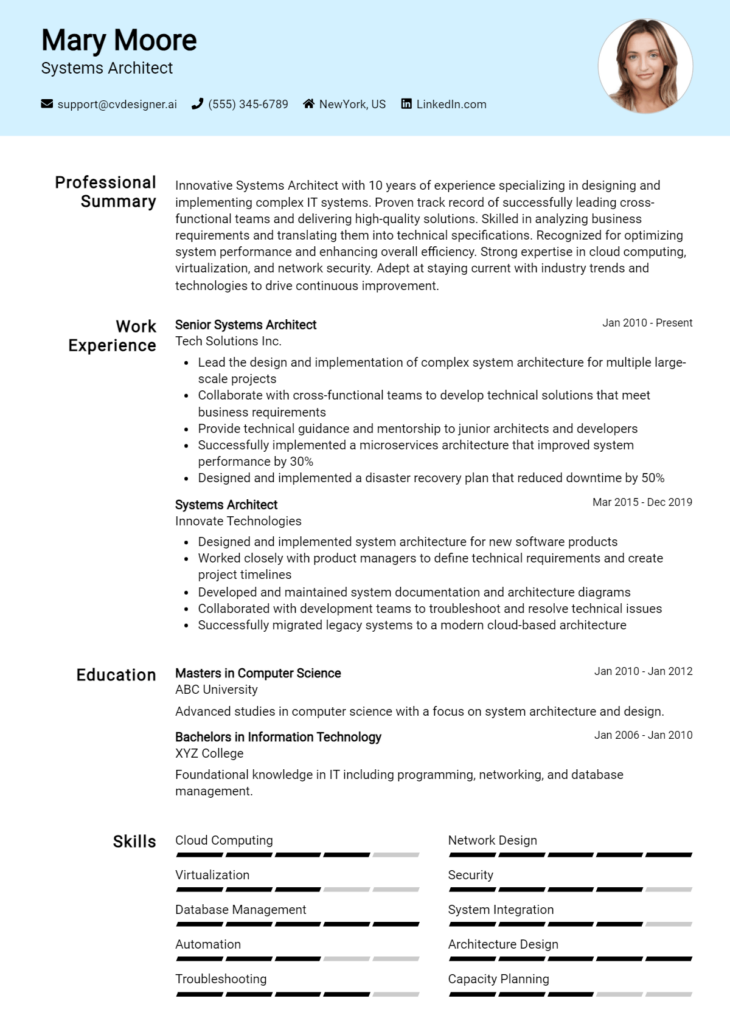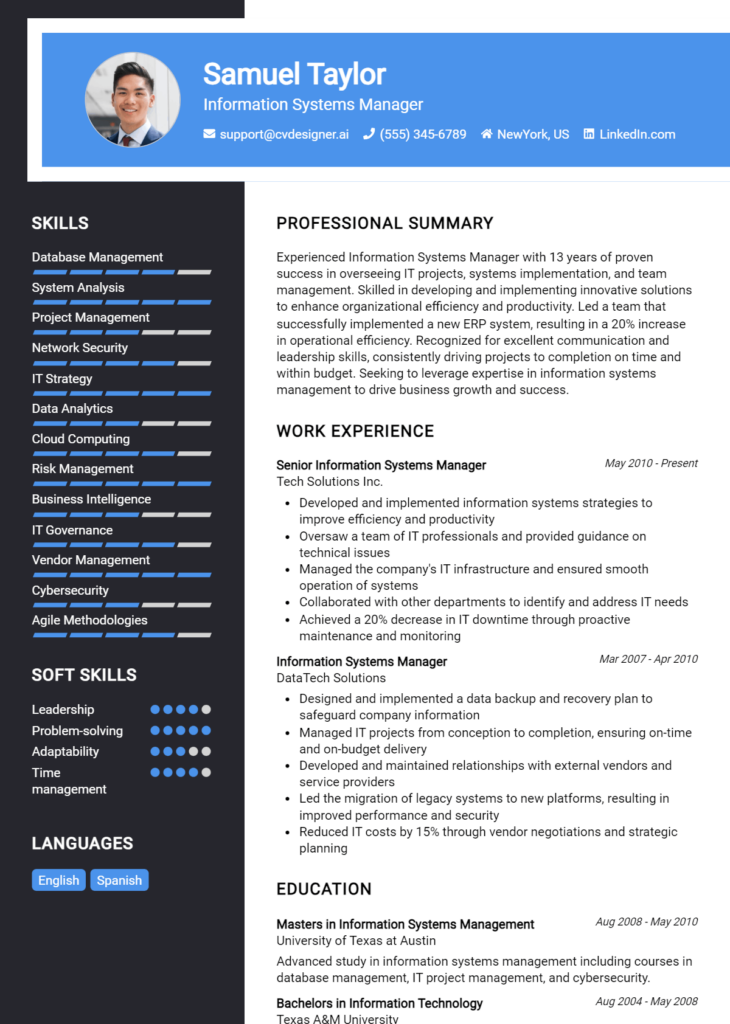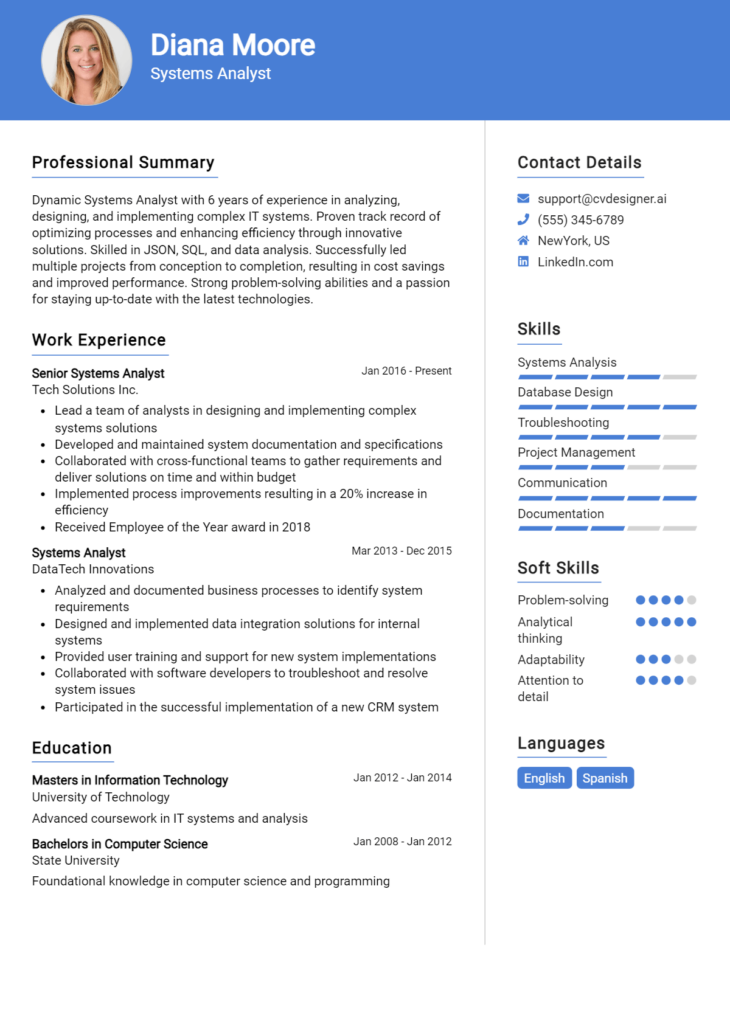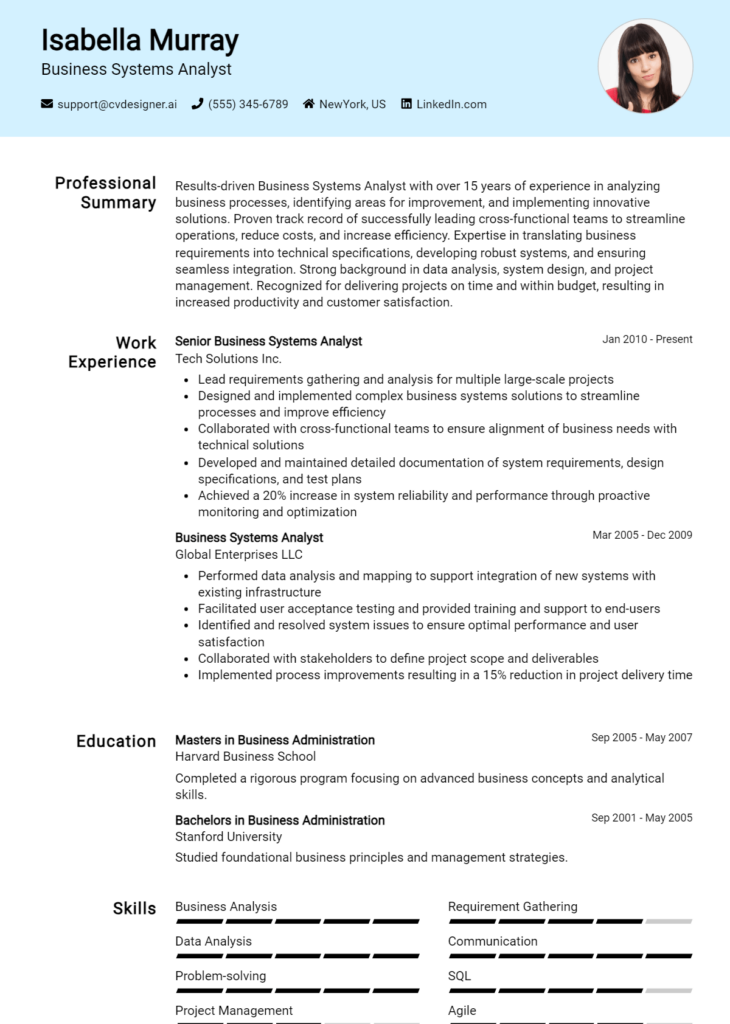Most Popular System Engineer Resume Examples
Explore additional System Engineer resume samples and guides and see what works for your level of experience or role.
As the backbone of technology infrastructure, System Engineers play a crucial role in designing, implementing, and maintaining complex systems that ensure seamless operations across various industries. Their expertise not only helps organizations optimize performance and reliability but also drives innovation in an ever-evolving technological landscape. Given the competitive nature of the job market, a well-crafted resume is essential for System Engineers to effectively showcase their skills, experience, and value to potential employers. A compelling resume can be the difference between landing an interview and being overlooked, making it a vital tool in your job search arsenal.
In this comprehensive guide to writing a System Engineer resume, we will cover essential aspects to help you create a standout document. You'll learn about the key responsibilities and skills that should be highlighted, the best formats to use for maximum impact, and common mistakes to avoid that could hinder your chances of success. Additionally, we will provide resume examples tailored for all levels of experience, from entry-level to senior positions. You'll also find valuable tips on effective resume writing techniques and guidance on selecting the right resume templates to enhance your presentation. Whether you're starting your career or looking for a new opportunity, this guide will equip you with the tools you need to create a resume that opens doors to exciting job prospects.
Key Responsibilities and Skills for a System Engineer
As a System Engineer, your primary responsibilities revolve around designing, implementing, and maintaining complex systems that meet organizational needs. This role requires a blend of technical expertise and problem-solving capabilities, ensuring that systems function efficiently and effectively.
Key Responsibilities:
- Analyze system requirements and ensure compatibility with existing infrastructure.
- Design and implement system architecture, including hardware and software components.
- Monitor system performance and troubleshoot issues as they arise.
- Collaborate with cross-functional teams to integrate new systems and technologies.
- Maintain documentation for system configurations, processes, and changes.
- Perform regular system updates and security checks to safeguard data integrity.
- Provide technical support and training to end-users and stakeholders.
Essential Skills:
- Proficiency in systems design and architecture.
- Strong understanding of networking and server management.
- Familiarity with operating systems (e.g., Windows, Linux).
- Experience with scripting and automation tools (e.g., Python, Bash).
- Knowledge of database management and data storage solutions.
- Problem-solving and analytical thinking abilities.
- Excellent communication and teamwork skills.
Highlighting these skills effectively in the resume skills section is crucial. Tailoring your listed skills and responsibilities to align with the job description can significantly enhance your chances of standing out to potential employers. Additionally, consider how these skills can be showcased in your CV to reflect your qualifications and experiences effectively, making you a compelling candidate for the role of a System Engineer.
Best Resume Format and Structure for a System Engineer
When crafting a resume for a System Engineer position, it’s crucial to choose a format that highlights your technical expertise and relevant experience effectively. Here’s a detailed guide on the best resume format and structure for a System Engineer.
Contact Information
At the top of your resume, include your contact information. This should consist of your full name, phone number, email address, and LinkedIn profile or personal website if applicable. Ensure that the email address is professional.
Professional Summary
A professional summary is a brief overview that summarizes your qualifications, skills, and career goals. Tailor this section to reflect your experience in system engineering, highlighting any specific technologies or methodologies you are proficient in. Keep it concise—2 to 4 sentences that encapsulate your core competencies and what you can bring to the role.
Work Experience
This section should detail your relevant work history. Start with your most recent job and work backward. For each role, include the following:
- Job Title
- Company Name and Location
- Dates of Employment (month and year)
- Key Responsibilities and Achievements: Use bullet points to describe your key responsibilities. Focus on accomplishments and quantify results when possible (e.g., "Reduced system downtime by 30% through proactive monitoring and maintenance"). Tailor this section to reflect the skills and experiences that are most relevant to the System Engineer role you are applying for.
Education
List your educational background, including degrees earned and institutions attended. Start with the most recent degree and include:
- Degree (e.g., Bachelor of Science in Computer Engineering)
- University Name and Location
- Graduation Date (month and year)
If you have relevant coursework, honors, or projects, consider including them as well.
Skills
In this section, list technical skills relevant to a System Engineer. Consider including:
- Operating Systems (e.g., Linux, Windows)
- Programming Languages (e.g., Python, Java, C++)
- Networking and Security (e.g., TCP/IP, firewalls)
- Cloud Technologies (e.g., AWS, Azure)
- Tools and Technologies (e.g., Docker, Kubernetes)
Make sure to tailor this list to the specific job description, emphasizing skills that match the requirements.
Certifications
Including certifications can enhance your credibility. List any relevant certifications, along with the date obtained. Examples may include:
- Certified Systems Engineering Professional (CSEP)
- AWS Certified Solutions Architect
- Cisco Certified Network Associate (CCNA)
- CompTIA Security+
Formatting Tips
- Choose a Clean Layout: Use a professional font (like Arial or Calibri) and a font size between 10-12 points. Ensure there’s adequate white space to improve readability.
- Use Bullet Points: For responsibilities and achievements, bullet points are easier to read than paragraphs.
- Keep It Concise: Aim for one page unless you have extensive experience that warrants two pages.
- Tailor Your Resume for Each Application: Highlight experiences and skills that are particularly relevant to the job description.
A well-structured resume complements a corresponding cover letter, which should provide additional context to your resume highlights. While your resume lists your skills and experience, your cover letter can elaborate on how these experiences have prepared you for the role. Use the cover letter to share specific examples of your work and how it aligns with the company’s goals, thereby creating a cohesive application package.
By following this format and structure, your resume will effectively present your qualifications as a System Engineer, making a strong impression on potential employers.
Writing Tips and Best Practices for a System Engineer Resume
Crafting a compelling resume as a System Engineer requires a strategic approach to showcase your technical skills, project experiences, and problem-solving abilities. Start by tailoring your resume to the specific job description, ensuring that your most relevant accomplishments stand out. Utilize action verbs to convey your contributions effectively, and quantify your achievements whenever possible to demonstrate the impact of your work. Remember to incorporate industry-specific keywords that align with the role you are applying for, as this not only enhances readability but also helps your resume pass through applicant tracking systems. For a polished and professional look, consider utilizing resume writing tips. Additionally, these best practices can also be applied when drafting a cover letter, enhancing your overall application.
- Use strong action verbs such as "developed," "implemented," and "optimized" to describe your responsibilities and achievements.
- Quantify your achievements with specific metrics, such as "reduced system downtime by 30%" or "managed a team of 5 engineers."
- Tailor your resume to each job application by including relevant keywords from the job description.
- Highlight your technical skills prominently, focusing on those most relevant to the position (e.g., programming languages, tools, and methodologies).
- Keep the format clean and professional, using bullet points for easy readability.
- Include a summary or objective statement at the top that clearly articulates your career goals and what you bring to the table.
- Make sure to proofread your resume multiple times to eliminate any spelling or grammatical errors.
- Consider the layout and design of your resume, ensuring it is visually appealing and easy to navigate.
Common Mistakes to Avoid in a System Engineer Resume
When crafting a resume for a System Engineer position, it's crucial to present your skills and experiences in a clear and impactful manner. However, many candidates fall into common pitfalls that can undermine their chances of landing an interview. These mistakes often stem from an overload of information, generic descriptions, or a lack of focus on relevant skills. To ensure your resume stands out for the right reasons, be mindful of the following common mistakes to avoid:
- Overloading the resume with excessive technical jargon that may confuse recruiters.
- Using a one-size-fits-all description for skills and experiences, rather than tailoring them to the specific job.
- Failing to quantify achievements with metrics or specific outcomes.
- Including irrelevant work experience that does not relate to the System Engineer role.
- Neglecting to highlight soft skills that are critical for teamwork and communication in engineering environments.
- Ignoring proper formatting, which can make the resume difficult to read.
- Writing in long paragraphs instead of concise bullet points that enhance clarity.
- Omitting keywords from the job description that can help pass through Applicant Tracking Systems (ATS).
- Not proofreading for spelling and grammar errors, which can create a negative impression.
- Failing to update the resume regularly to reflect new skills and experiences.
To further enhance your application materials, consider reviewing the common mistakes to avoid in a resume and also take a look at common cover letter mistakes to ensure your entire application is polished and professional.
Sample System Engineer Resumes
As a System Engineer, your resume should effectively highlight your technical skills, experience, and problem-solving abilities. Below are three sample resumes tailored for different levels of experience: an experienced professional, an entry-level candidate, and a career changer. These examples will guide you in crafting your own compelling resume. For further inspiration, explore more resume templates and consider pairing your resume with matching cover letter examples to enhance your job application package.
Sample Resume 1: Experienced Professional
John Doe
123 Main St, Anytown, USA
(555) 123-4567
john.doe@email.com
Professional Summary
Highly skilled System Engineer with over 8 years of experience in designing, implementing, and maintaining complex systems. Expertise in cloud computing, network security, and automation. Proven ability to lead projects and collaborate with cross-functional teams to deliver high-quality solutions on time and within budget.
Technical Skills
- Operating Systems: Windows, Linux, Unix
- Programming Languages: Python, Bash, Java
- Tools: Docker, Kubernetes, Ansible, Jenkins
- Cloud Platforms: AWS, Azure, Google Cloud
- Networking: TCP/IP, VPN, Firewalls
Professional Experience
Senior System Engineer
ABC Tech Solutions, Anytown, USA
June 2018 - Present
- Lead a team of engineers in the design and deployment of scalable cloud architectures, resulting in a 30% reduction in operational costs.
- Developed automation scripts to streamline deployment processes, decreasing system setup time by 50%.
- Collaborated with IT security teams to implement robust security protocols, enhancing system integrity and compliance with industry standards.
System Engineer
XYZ Innovations, Anytown, USA
June 2015 - May 2018
- Managed the installation and configuration of network systems, improving system performance and reliability.
- Conducted system audits to identify vulnerabilities and recommend solutions, leading to a 20% decrease in incidents.
- Assisted in the migration of on-premises applications to cloud-based platforms, improving accessibility and scalability.
Education
Bachelor of Science in Computer Engineering
University of Anytown, 2015
Sample Resume 2: Entry-Level Candidate
Jane Smith
456 Elm St, Anytown, USA
(555) 987-6543
jane.smith@email.com
Objective
Motivated and detail-oriented recent graduate with a Bachelor’s degree in Computer Science seeking an entry-level System Engineer position. Eager to apply technical skills and knowledge in a challenging environment to contribute to innovative projects.
Technical Skills
- Operating Systems: Windows, Linux
- Programming Languages: C++, Python
- Tools: Git, VirtualBox
- Networking: Basic understanding of TCP/IP and DNS
Education
Bachelor of Science in Computer Science
University of Anytown, 2023
- Relevant Coursework: Systems Architecture, Networking Fundamentals, Cloud Computing
Internship Experience
System Engineering Intern
Tech Corp, Anytown, USA
June 2022 - August 2022
- Assisted in the configuration and testing of server systems to ensure optimal performance.
- Collaborated with senior engineers to document system processes and troubleshoot issues.
- Gained hands-on experience in using cloud platforms and managing virtual environments.
Projects
- Developed a personal project using Python to automate system monitoring and reporting, showcasing problem-solving skills and initiative.
Sample Resume 3: Career Changer
Michael Johnson
789 Pine St, Anytown, USA
(555) 321-7654
michael.johnson@email.com
Summary
Dynamic professional with 5 years of experience in software development transitioning to a System Engineer role. Strong analytical skills and a proven track record in problem-solving, combined with a passion for technology and systems design. Seeking to leverage software development experience to excel in systems engineering.
Technical Skills
- Programming Languages: Java, Python, SQL
- Operating Systems: Linux, Windows
- Tools: Git, Docker, Jenkins
- Networking: Familiar with TCP/IP, DNS, and DHCP
Professional Experience
Software Developer
ABC Software Solutions, Anytown, USA
March 2018 - Present
- Developed and maintained web applications, enhancing user experience and application performance.
- Collaborated with cross-functional teams to gather requirements and design software solutions, demonstrating strong communication and teamwork skills.
- Conducted code reviews and implemented best practices in software development, improving code quality.
Junior Developer
XYZ Technologies, Anytown, USA
January 2016 - February 2018
- Assisted in the development of internal tools to streamline business processes, resulting in a 25% increase in efficiency.
- Gained exposure to systems architecture and participated in design meetings, fostering an interest in systems engineering.
Education
Bachelor of Science in Information Technology
University of Anytown, 2015
These sample resumes provide a framework for showcasing your unique qualifications. Tailor your resume to reflect your skills and experiences, and remember to explore additional resources for enhancing your job application materials.
Checklist for a System Engineer Resume
- Proofread for Typos and Grammar Errors: Carefully read through your resume to check for any spelling or grammatical mistakes. Consider using tools like Grammarly for additional support.
- Check Formatting Consistency: Ensure that font styles, sizes, and spacing are uniform throughout the document. Consistency enhances readability and professionalism.
- Tailor Your Resume to the Job Description: Customize your resume for each application by incorporating keywords and phrases from the job listing to demonstrate your alignment with the role.
- Highlight Relevant Skills and Technologies: Clearly list the technical skills and tools that are pertinent to the System Engineer position, ensuring they match the requirements of the job you are applying for.
- Use Action Verbs and Quantifiable Achievements: Start bullet points with strong action verbs and include specific accomplishments that showcase your impact in previous roles, such as “improved system reliability by 30%.”
- Keep it Concise: Aim for a one-page resume if you have less than 10 years of experience. Include only the most relevant information to keep it focused and impactful.
- Include Contact Information: Verify that your contact details are current and prominently displayed at the top of your resume, making it easy for employers to reach you.
- Seek Feedback from Peers or Mentors: Share your resume with trusted colleagues or mentors for constructive feedback before finalizing it. They can provide valuable insights and catch any overlooked errors.
- Consider Using an AI Resume Builder: Utilize an AI resume builder to ensure all elements of your resume are well-organized and professionally presented.
- Apply a Similar Checklist to Your CV or Cover Letter: Remember that a comparable checklist can be beneficial when creating a CV or cover letter. This will help maintain quality and consistency across all your application materials.
Key Takeaways for a System Engineer Resume Guide
As you embark on creating your System Engineer resume, remember that a well-crafted document is your first step towards landing your dream job. Utilize the examples and tips provided to highlight your technical skills, project experiences, and problem-solving abilities effectively. Consider downloading a professional resume template from resume templates to ensure your layout is visually appealing and ATS-friendly. Don’t forget to complement your resume with a strong cover letter by choosing from our cover letter templates, which will allow you to express your enthusiasm and fit for the role. For a seamless experience, try our best resume maker to customize your resume quickly and efficiently. Additionally, following similar guidelines will enhance your chances of creating a compelling CV and an impressive cover letter. Take these next steps to set yourself apart in the competitive job market!
